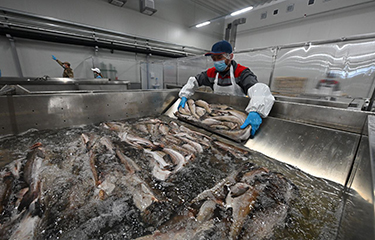Russia's government is exploring ways to create a marketing body to promote the country’s seafood in the wake of a massive drop in the country’s exports to China.
China long served as the primary destination for seafood exports. In 2020, Russia sold more than one million metric tons (MT) of seafood – primarily pollock – to China. That total represented 61 percent of Russia’s total seafood exports by volume.
However, in late 2020, Russia’s trade relationship with China became strained as China tightened its inspections and controls on imported seafood, after it claimed traces of COVID-19 had been found on the packing of imported seafood products.
The result was dramatic. In the first half of 2021, Russian seafood shipments to China decreased 83 percent by volume compared to 2020, and nearly half in value. Russia's H1 2021 seafood exports totaled just 160,000 MT, worth USD 442 million (EUR 380 million). Over the first eight months of 2021, Russia's seafood export volume has plunged 72 percent year-over-year, to 214,000 MT.
Significantly, China is no longer the top export destination for Russian seafood. South Korea has claimed the top spot, as its Russian seafood imports have increased by 48 percent to 459,200 MT thus far in 2021 – although some of that total likely entered China.
Efforts by Russian officials and seafood companies to ease China's restrictions have thus far not resulted in any changes to China's inspection regime. In a speech at the Global Fishery Forum held in Saint Petersburg in early September, a high-ranked representative of the Russian Federal Service for Veterinary and Phytosanitary Surveillance (Rosselkhoznadzor), Evgeniya Lazutkina, acknowledged there is little chance the bilateral trade relationship will change in the near-term. China, she said, will not be easing its food inspection regime. She urged Russian companies to either adapt to the new rules or to find new markets.
To aid companies pursuing the latter strategy, Russian Federal Agency for Fisheries Ilya Shestakov recently said the nonprofit organization “Russian Fish” will pivot from a focus on China to promoting the country’s seafood in other parts of the world.
“We have money for it, but we need to negotiate how to do it,” Shestakov said.
The idea has been in the works for years, but hadn’t materialized – but the restrictions from China have added new urgency to finding new markets for the country’s seafood, Shestakov said.
Since the spring, when Russian seafood companies began seeking new markets, many have reported some level of success. Statistics released by Rosselkhoznadzor on 8 August indicate that Nigeria has imported 21,500 MT of Russian seafood in 2021 – an increase of 116 times year-over-year. Exports to France also jumped, by 3.7 times, to 4,500 MT, and exports to Norway jumped a multiple of 2.6, to 11,700 MT. Portugal has purchased 2.5 times more Russian seafood than it did in 2020, at 1,360 MT; and Poland increased its Russian seafood imports by 2.4 times, to 5,800 MT. More Russian seafood is also flowing to Spain, Uzbekistan, Germany, the United Kingdom, Thailand, Kazakhstan, and Belarus, according to updated trade statistics. And further diversification is likely, as Rosselkhoznadzor reported it is in talks with authorities in South Africa, Namibia, India, Cuba, U.A.E., and other countries to affirm recognition of Russian veterinary certificates and other trading documents to enable the export of more Russian seafood to those countries as well.
But Russia - one of the world's largest seafood producers - is still struggling with a glut of many products and is also aiming to build up its own domestic seafood market in order to ease its surplus and improve its food security.
Photo courtesy of The Russian Fishery Company







